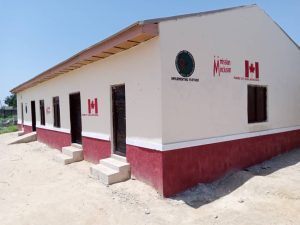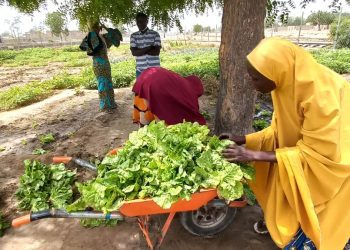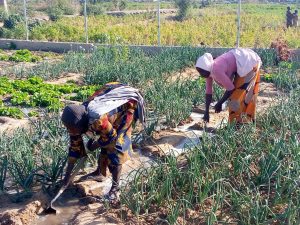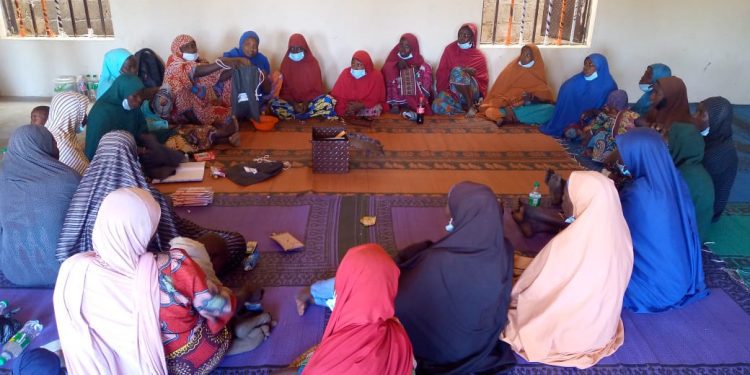“I was sexually assaulted in our neighborhood at the camp. We all do not know who the perpetrator is, or where he came from, I was about 14 years of age when the incident happened,” uttered in dismay, Habiba Mustapha*, who is now 17.
Mustapha* laments how she and her family have to remain quiet and accept the heartbreaking fate of what has happened to her.
“My parents and I fled from Konduga during the Boko Haram insurgency nine years ago and settled in Maiduguri at the Shuwari Lambu Camp.
“We had nowhere to access basic amenities like healthcare centres, talk more of justice when the incident occurred. All we could do at that moment was to report what happened to the community
She asserted, however, how women’s and girls’ safe space swiftly changed her life. “My mother was the one who introduced me to the safe space when the place was established.
“I got registered by the organisation and I started attending the counselling session; first it was one on one interaction between the counsellor and me, where she would passionately talk to encourage me. She built the strength in me to start sharing how I was feeling before moving me to a group of young girls.”
Victims of Gender-Based Violence (GBV) were engaged and kept occupied in a series of life-saving activities at the safe space.
“We are being trained on personal hygiene, understanding our rights as young girls and skills acquisition,” said Mustapha*.

Some Problems that reinforce GBV Against Displaced Women and Girls
Sector Manager, GBV Coordinator, Gender Equality Peace and Development Center (GEPaDC), MaryKim Nwune Jerry, said, “women and girls victims of different forms of gender-based violence and others who underwent series of traumatic event during the insurgency in Borno state, continued to face the hardship of surviving as Internally Displaced Persons (IDPs) and even after resettlement to their ancestral homes by the state government.”
The GEPaDC Sector Manager, outlined some challenges these survivors had to encounter as they strive to earn a living after experiencing the over a decade of conflict that stormed Borno.
“Women and girls in Pulka and Gwoza, a local government area in the southern part of the state, are sexually and physically abused by the insurgents whenever they go out to look for firewood to cook for their family.
“Another pressing need of the survivors is how they could secure farmlands, because back in their communities, most of these women are used to irrigation farming; securing a farmland became a challenge to almost all of them, particularly ones that are staying in the camps. They were pre-exposed to assault and harassment whenever they went in search of one.
“Staying idle increased the level of demand from their husbands, which triggered violence against these women by intimate partners,” Marrykim Nwune Jerry explained.
Also, the National Human Right Commission NHRC has in 2022 recorded 495 SGBV cases in Borno state.
Nigerian Minister of Women Affairs, Pauline Tallen in 2021 said “Poverty is one of the principal causes of Gender-Based Violence in Nigeria, as women that are economically not empowered are vulnerable to abuse.
The World Health Organisation (WHO) affirmed that 1 in 3, or 30%, of women, have been subjected to physical and/or sexual violence by an intimate partner or non-partner.
The Intervention
Gender Equality Peace and Development Center GEPaDC had in 2021 built three permanent Women and Girls Safe Space (WGSS) across Borno state, located at Shuwari Lambu IDP camp in Maiduguri, Pulka and Gwoza Local Government Areas and two temporary safe spaces at Bakassi camp (now closed) and Wulari Jerusalem EYN Camp.
These safe spaces are built for women and girls who are survivors of any form of GBV and others who had traumatic experiences during the insurgency, with the objective of giving the women a serene atmosphere to ease their psychological stress through other activities; develop their courage of surviving as women; equip them with entrepreneurial skills and empower them to bounce back better.
GEPaDC Case Worker, Ogar Theresa Odiri, also explained other services rendered by the organisation that serves as a channel for the survivors to access justice and health care services.
The GBV case worker in Shuwari Lambu, Ogar Theresa Odiri, said “We do counselling sessions, psychosocial services (PSS), case management and legal case referrals where we refer cases that cannot be handled by our organisation to the Human Rights Commission and police for proper jurisdiction.”
Way Forward
Over the years, Gender Equality Peace and Development Center (GEPaDC) secured a land beside Shuwari Lambu IDP camp, constructed a borehole and established an intensive urban agricultural farming for women beneficiaries of the safe space at Shuwari Lambu.
28 years old Fatima Mohammed, a beneficiary of GEPaDC’s intensive urban agriculture, shared how the safe space and its services helped her life.
“I had attended different sessions on the irrigation farming system, where I learnt how to manage my plants. I have been benefiting from this farm since the beginning of the project. I support my family and have also passed down the knowledge to other women in my community,” Mohammed said.
She noted, however, that things are not the same again, since the GEPaDC stopped its operation in March, 2022.
“I rely so much on the farming items the organisation used to provide. I didn’t save enough money to sustain what I am doing. I used the little money I got after selling the vegetables to buy other food items for my family,” she narrated.
At the moment when their project ended, things became hard for them again, but the knowledge obtained on how to maintain farms helps in managing the farming business.
Zainab Abdullahi, mother of seven, attested to how the entrepreneurial skills were supporting her livelihood as a single mother.
“I use plastic bottles to package the liquid detergent I produce and sell it at 200 Naira per bottle. Even though it lack some quality features, people still buy it and it has been bringing food to our table with my children,” Abdullahi explained.
She went further to explain how other women including her eldest daughter learned to mix the liquid detergent from her.
“The organisation during the training urged us to pass down the knowledge to other women, so women from my community who did not have the opportunity to join the training come to my house to learn from me and that includes my daughter who is now 15,” she said.
The GEPaDC Officer, MaryKim Nwune Jerry, further elaborated other activities and responses of the organisation towards key issues that hinder means to earn of women and girls in Borno.
“These women are grouped into four with 25 members in each group. We provide them with fertiliser, seedlings and chemicals, in which among themselves, they organised a cooperative of the Village Savings and Loan Association (VSLA). Through this association, they save money for emergency situations and lend loans to support their mini businesses,” MaryKim Nwune Jerry explained.


The anti-GBV coordinator added that the borehole gives the IDPs access to clean drinking water and they also make use of the water for other domestic works.
Besides intensive urban agriculture, GEPaDC empowers women and girls through skill acquisition to become self-employed.
“We held monthly sessions in 2021-2022 with 240 adolescent girls and women from three permanent safe spaces on sexual reproductive health and trained them on how to make liquid soap and vaseline, which at the end of every training we provided them with the necessary things they would need during the production,” said Jerry.
The Sector Coordinator narrated that “From Pulka and Gwoza LGA, cooking energy is a pressing need, so, GEPaDC provided production machines and trained 300 women on how to make charcoal briquettes from waste materials, these women are not only using the briquettes for their domestic work, but they also sell it in their community at three per N50.
“Under our GBV case management, we have over 300 cases managed, including referred cases that are forwarded to legal authorities in the state, and our psychosocial services also hold about 450 women monthly across the three permanent safe spaces,” the sector Coordinator stated.
Problems before, during, and after the Intervention.
Hadiza Mohammed 32, a beneficiary of the safe space saw the lack of ultimate cooperation by some women as a threat to the success of the intervention.
“I am one of the 25 women grouped under the intensive urban agricultural farm, whenever it’s time to work on the farm the remaining women will not come out but when it’s time for the harvest all the 25 will be there to claim the fruit of our labour, and that brings chaos between us and also poor yielding outcome from the farm,” Mohammed explained.
“The organisation noticed the poor turned out and they seemed disappointed, which later led to them to start paying us 2000 naira weekly to motivate the remaining women,” she said
An adolescent girl, Rebecca Musa Ayuba, lamented over lack of capital to buy production materials after the training as an obstacle towards what they can achieve with the entrepreneurial skills acquired.
“Many of us at the camp don’t have financial support to keep the business running and the production process of these hand detergents and others need money, most of us ended up spending the profit gained from the starter pack they gave us in doing other things, and many now abandoned what we have learned during the training as a result.”
GEPaDC financial manager, Ann Darman Bukar described poor sustainability and lack of ownership as a huge challenge in achieving their basic objectives.
“Our sustainability strategy is designed with the expectation that the beneficiaries will take over the work, example like the irrigation farming, since we have trained them on how to manage the place, but they refuse to take ownership, which at the end of the project our intervention stands stranded after the life span of project, before starting up a new one. Though our organisation is in collaboration with government ministries like the Ministry of Women Affairs, they also lack funding from the government to take ownership,” Bukar said.
The Finance manager, Mrs. Darman Bukar lamented the lack of cooperation from community leaders during the implementation of the WGSS project at Shuwari Lambu.
“When we first went to the area, we had to buy the land to build the safe space, which we didn’t expect, because the people from Pulka and Gwoza gave us the land for free, but here they refuse even after telling them that it is a community service that we want to render. “After that, when we decided to establish an intensive urban agricultural farm we had to rent the land which is a federal government land, but the community leader is the one taking care of the place, so we have been paying for the land for the past few years,” she said.
The resettlement project by the Borno State Government brings about the issue of mobility of targeted beneficiaries which affects the process of measuring the impact of the organisation.
“In 2022, while we are in the midst of skill acquisition training which comprises both women and girls, about half of the IDP trainees are moved to their ancestral homes, we cannot start the training all over again and we cannot continue with only the remaining trainees, so we have to select others randomly from the community before we continue which they don’t have the start-up knowledge of what we are doing,” Bukar narrated.
Proffered Solution
Borno State Government and other Non-governmental organisations in the state have been on the move to bring back the lost glory of education in the state, yet a lot needs to be done, especially for adolescent girls who are survivors of Gender Based Violence, said a GBV case worker, Ogar Theresa Ogiri.
“There is a literacy gap among IDPs requiring urgent redress. In every session, I had with the survivors (adolescent girls), education is what they have been singing. Also I believe that if education becomes accessible to all, it will reduce the menace and it will give these girls the opportunity to stand for themselves and protect their rights, so, doubling up the effort of getting these girls back into class will go a long way in protecting them from Gender related issues,” Ogar Theresa Ogiri said.
In 2022, Borno state government reported 1.8 million children out of school in the state. The Sector Manager, MaryKim said “issue of sustainability on the different forms of intervention in Borno should be made a priority.”
The Financial Manager also said: “There’s a need for the government to create direct sustainability projects to support humanitarian interventions to mitigate the gaps at the end of projects,” she said.
This story has been made possible by Nigeria Health Watch with support from the Solutions Journalism Network, a nonprofit organization dedicated to rigorous and compelling reporting about responses to social problems.

